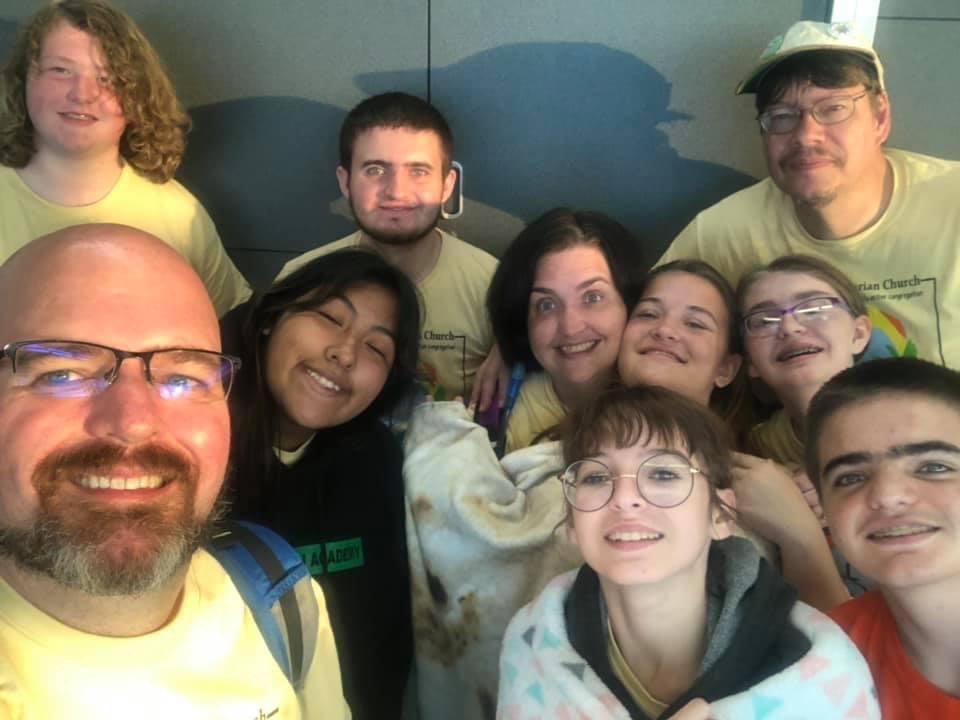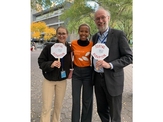Pentecost
These, too, are children of God
Like most kids, Josh Davenport-Herbst has always had a hard time saying no to his parents, especially when it came to showing up for stuff at church.
But then Josh will tell you that he isn’t like most kids.
Sure, he likes the Harry Potter books and pizza and helping to distribute food boxes to those in need in his community. But unlike most kids, both of Josh’s parents are Presbyterian Church (U.S.A.) pastors. And unlike many of his peers, Josh doesn’t like to be around too many people, loud noises or too much excitement.
That’s because Josh is among nearly 5.5 million adults in the U.S. with autism spectrum disorder (ASD).
And because that means Josh has difficulty communicating and interacting socially with others, the prospect of attending the Presbyterian Youth Triennium in 2016 was a formidable challenge for him.
“Back then I was not very social,” Josh said. “I wasn’t against meeting people, just ambivalent.”
Held every three years, Triennium is a gathering that draws over 3,000 high-school-age youth, youth leaders and young adults from across the PC(USA) and the Cumberland Presbyterian Church.
And what the Triennium’s plenary sessions can be known for — in addition to the consistently excellent preaching, their dynamic and youth-oriented illustrations, and the use of drama — are their occasional flashing lights, loud music, streamers and daily energizers. This made the PC(USA)’s national youth event that much more daunting for the then 18-year-old, who, like others on the autism spectrum, is especially sensitive to his environment.
“For the most part, I was only anxious during the energizers,” Josh said. “I liked the energizers themselves, but not the thousands of people who were shouting along with them.”
In preparing Josh and later accompanying him to the 2016 Triennium as a member of the delegation from Tres Rios Presbytery, Josh’s father, the Rev. Dr. Timothy Davenport-Herbst, had good reason for concern.
“In my experience, everything for our youth is organized around student council, sports, high-energy extroversion and being in a crowd,” said Davenport-Herbst, pastor of St. Paul Presbyterian Church in San Angelo, Texas. “If you’re not the kind of person who thrives on that, there’s no place for you.”
Having grown up in an upper-middle-class Presbyterian church in the Detroit suburbs, Davenport-Herbst himself found youth group to be designed primarily for “achieving, ambitious kids.” It was after two of his own three children were diagnosed as being on the autism spectrum that he really started to see and understand the need for greater inclusion.
“These folks need youth group, too,” he said. “These, too, are children of God.”
In fact, being sensitive to his family’s needs was a key consideration in his accepting the call from St. Paul Presbyterian Church 13 years ago.
“Rural communities tend to have more space for diversity,” said Davenport-Herbst. “At our church, we have youth with sensory processing disorders, borderline personality, ADD, ADHD, cancer survivors, bipolar and several with trauma. Communities like ours are more accustomed to dealing with nonconformity.”

Sam Davenport-Herbst (Contributed photo)
Bringing those same sensibilities to the 2016 Triennium, Davenport-Herbst watched with concern as several from his group became overwhelmed by the programming in the main auditorium.
But then a door — actually, a balcony — opened. Davenport-Herbst saw a way for people to enjoy the experience away from the noise.
“In 2016, the balcony happened,” he said.
Later, on Instagram, he posted, “Triennium opened the entire top balcony just so people with sensory issues could join in!” And the staff of Triennium enhanced their participation by utilizing experienced community life volunteers to provide welcome.
Creating such a safe and welcoming space for all of God’s children in the life of the Church is what the Pentecost Offering — one of the PC(USA)’s four Special Offerings — is all about.
Not only do gifts to the Pentecost Offering benefit young people like Josh by supporting the Office of Presbyterian Youth and Triennium, but the offering also helps to fund the Presbyterian Mission Agency’s Young Adult Volunteer Program and the “Educate a Child, Transform the World” national initiative.
Forty percent of the Pentecost Offering is retained by individual congregations for local ministries in their communities, while the remaining 60% is used to support children at risk, and youth and young adults through ministries of the Mission Agency.
Although the Pentecost Offering may be taken anytime, most congregations receive it on Pentecost Sunday, which this year falls on June 5.
Gina Yeager-Buckley, associate for the Mission Agency’s Office of Presbyterian Youth and Triennium, said that because the planning process for each Triennium begins “from scratch” immediately following the most recent event, the team is uniquely positioned to be sensitive to emerging needs and new trends.
“Because we learn so much from what we see and observe at each Triennium, we have witnessed a good incline of growth from event to event in terms of making Triennium more inclusive, enterable, welcoming and relevant for the young people who are there ‘right now,’” she said.
Other ways in which the planning team seeks to build accessible, caring, safe and inclusive spaces include providing translation and American Sign Language interpretation and making sure that participants using wheelchairs are accommodated in the primary venue rather than in spaces that are isolated and away from the group. Such practices allow attendees to be cared for and have their needs met while still being together with their friends and leaders.
“We also formed a volunteer Care Team, whose primary role is to ‘see’ the participants, to notice them and to let them know that they have been seen and are joyfully welcomed into the community,” said Yeager-Buckley. “Because of COVID-19, we will also have a team of professional, licensed counselors and therapists at the [upcoming] Triennium who specialize in adolescent care. We want to be attentive to the anxiety and isolation that many have been experiencing during the pandemic, as well as anticipate what it may be like for everyone to be with so many people for the first time in a long time.”
Yeager-Buckley is also excited that the theme for the next Triennium, “When Did We See You?,” comes directly from the passage at the heart of the PC(USA)’s Matthew 25 vision.
“We will be particularly focused, with our young audience, on the action, the gift and the responsibility of ‘seeing,’” she said. “What it means to ‘see,’ how we are ‘seen,’ how we ‘see’ but often do not process what we’ve seen, as well as who is not ‘seen,’ and what it means that God sees all, but we do not.”
In addition to engaging the three Matthew 25 emphases of dismantling structural racism, eradicating systemic poverty and building congregational vitality, Yeager-Buckley said that the event would lean into the Presbyterian Reformed ideal of “The Call of the Community.”
“We have heard and we feel convicted that the Church and, indeed, God are calling our young people to see and to be seen,” she said. “And God expects these incredible young Presbyterians to be agents of healing.”
That’s a call that fits Josh well.

Josh Davenport-Herbst (Contributed photo)
While he was attending Triennium for a second time in 2019, he jotted a note to himself that read, “I’m an agent of change.” His father offered that one of Josh’s first plans as a change agent was to figure out how to buy an area elementary school and convert it into a shelter for the homeless.
To keep the momentum going, Josh, who is now 21, would attend Triennium again if he could.
“They accommodated my picky eating habits,” he said. “They didn’t force me to socialize with too many people. They let you do what made you comfortable. The schedule really helped me; otherwise, I would have wandered around or probably gone back to the dorm. I really liked the prayer room, a place where you could just be quiet.”
Triennium will have a new feature named “The Quiet Quarters,” a space away from the crowd where a participant can experience the event with some distance and quiet, unplug completely, sit quietly and, if needed, talk with a pastoral care leader.
Timothy Davenport-Herbst looks forward to all these things and more as he makes plans to experience Triennium again with a new presbytery delegation.
Because he chairs the presbytery committee that awards grants and scholarships, he hopes that his ministry colleagues will be just as generous in their financial support of Triennium participants as the Pentecost Offering is.
“I support all of the Special Offerings,” said Davenport-Herbst. “When Presbyterians made the decision to be fully inclusive, they made the decision to do some very difficult work. And even though we may not have counted the cost on all of those things, we are willing to pay that cost in our discomfort and the way that brings us into greater levels of grace and celebration of God’s image in diverse people. I think the PC(USA) is seeking and making every effort to welcome people that are not welcome in traditional places, and as we do that, we live into the love of Jesus Christ more and more.”
Give to the Pentecost Offering to continue the valuable work of the Office of Presbyterian Youth and Triennium.
Note: Because of the ongoing pandemic, the 2022 Presbyterian Youth Triennium (PYT), which had been scheduled for July 24-27 in Indianapolis, Indiana, has been canceled. The PYT team is proceeding with its plans for PYT Beyond and Triennium Connect, the newly expanded ministries for Presbyterian youth that will offer virtual sessions, cohorts for youth and adults and online courses related to the theme, “When Did We See You?” Plans, resources, and opportunities for “Beyond” and “Connect” will begin to circulate in spring and summer. For more information or to participate, go here. The Pentecost Offering continues its support of the PYT and Presbyterian Youth.
This was published for Presbyterian News Service on May 17, 2022.
read more stories:
participate with us
When we all do a little,
it adds up to a lot.
By giving to the Pentecost Offering, your congregation participates in helping our children, youth, and young adults grow up to proclaim with the Psalmist, "O God, from my youth you have taught me, and I still proclaim your wondrous deeds."







